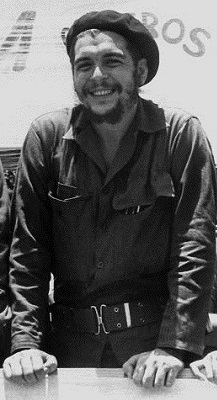|
~ Ernesto Che Guevara
~ Galéria
~ Oldal
~ Bejelentkezés
~ Vissza a Főoldalra
Ernesto Che Guevara, az argentin származású forradalmár, miniszter, gerillavezér és író, Buenos Aires-ben szerzett orvosi diplomát, majd a kubai forradalom során jelentős szerepet játszott a szigetország felszabadításában és újjáépítésében. A kubai gazdaság talpraállításáért dolgozott, küzdött az oktatás és az egészségügy fejlesztéséért, az írástudatlanság és a faji előítéletek felszámolásáért. Saját példájával népszerűsítette az önkéntes munkát. Kongóban és Bolíviában is harcolt - harminckilenc éves volt, amikor az amerikai-bolíviai csapatok csapdába ejtették és kivégezték.
| | |
|

| | |
|
|
Articles about Che Guevara |
|
An exhibition: Ernesto Che Guevara Complex
2014.01.24. 10:35

An exhibition commemorating the 25th anniversary of the inauguration of the Ernesto Che Guevara Complex (December 2013)
By the help of rare, panoramic photos, the exhibition shows how the Ernesto Che Guevara Complex [here you can read about it and check out some photos] was being created, by its architects, artists and those hundreds of voluntary workers who made it. These people could even meet again, after so many years, and now they exchanged their memories and remembered the huge silence when Che's gigantic statue was being erected - and the moment when it took its place safely and suddenly everyone was cheering loudly and clapping their hands.
Some people even donated special objects like a wooden effigy of Che (that you can see above).
The exhibition is open till the end of January.
Source
| | |
|
|
|
~ Ernesto Che Guevara
~ Gallery
~ Site
~ Log in
~ Back to the Main page
Ernesto Che Guevara, the Argentine-born revolutionary, minister, guerrilla leader and writer, received his medical degree in Buenos Aires, then played an essential part in the Cuban Revolution in liberating and rebuilding the country. He did his best to set up the Cuban economy, fought for the improvement of the education and the health system, the elimination of illiteracy and racial prejudice. He promoted voluntary work by his own example. He fought in the Congo and in Bolivia - he was thirty-nine years old, when he was trapped and executed by the joint American-Bolivian forces.
| | |
|
|

